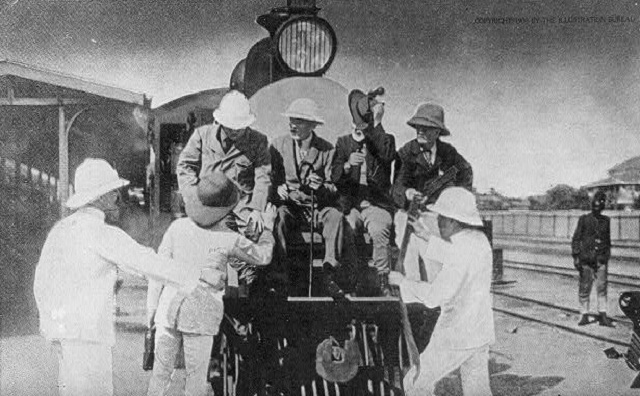
How European claims to promote `civilisation’ in Africa remain the supreme aim of all our governments
THE LAST WORD | Andrew Mwenda | One of the most successful ideological projects in contemporary history has been European colonialism, or what Marxists used to call imperialism. Vladimir Lenin called imperialism the highest stage of capitalism. The growth of capitalism imposed certain demands on the European bourgeoisie. They needed to find new sources of raw materials for their industries, areas to invest surplus capital, new markets for their manufactured products and cheap labour.
However, this imperial aim needed an ideological justification. It could not be justified with the self-interested economic reasons above. Hence the European bourgeoisie presented colonialism to itself and its audiences at home plus to its victims in “backward” societies as an altruistic mission for the benefit of the colonised; bringing the three Cs i.e. Christianity, Civilisation and Commerce.
Christianity was the spiritual emancipation of native souls from devil worship, civilisation European administrative and cultural enlightenment, and commerce was liberation of natives from poverty and misery and deliver them to economic prosperity. Colonialism consolidated in large part because the colonised were ideologically won over to the belief that it was for their good.
Today, all poor nations are involved in a struggle to achieve these colonial aims using different words. What colonialism called “civilisation” is what is today called development, Christianity gave way to a secular religion called democracy and commerce represents our obsession with international trade and foreign direct investment. Practically every country in the developing world is engaged in a titanic struggle to achieve these colonial goals.
The nationalist struggle for independence was not a rejection of the colonial project but rather the agency for its implementation. They argued that white elites were hypocritical. They were not helping Africa become like Europe. Instead they were exploiting the continent for themselves. The nationalist leaders for Africa’s independence, therefore, did not seek to dismantle the colonial state or even change its aims. Rather they sought to inherit it and use it to exploit Africa’s resources to achieve what colonialism claimed was its mission – to civilise Africa.
Karl Marx had argued that capitalism inherently carried the forces of self-destruction – which he termed “the grave digger problem.” For Marx, the more successful the bourgeoisie are in their project of accumulation, the more they would produce a class, the proletariat, whose interests would be at conflict with the interests of capital. Marx then predicted that at it’s most successful, capitalism would destroy itself i.e. the proletariat would rise and overthrow the capitalists and take control of the means of production.
Marx’s prediction on capitalism failed in the economic sphere but succeeded in the colonial world. Colonialism would inevitably educate Africans with the formal education of Europe; thereby exposing Africans to European (capitalist) ideals of civil liberties, self-government, equality, etc.
Yet for a small foreign minority to rule over a large native population, it required an ideology of racial superiority. Therefore, the more successful colonialism would be in Europeanising natives, the more it would produce a class of African elites who would seek its overthrow.
African nationalist leaders at independence were equally the most exposed to Western ideas. For the most part they had grown to admire modern European life and equally despise traditional African life. Their ambitions to modernise Africa were only equalled by the claims of the colonialist to “civilise” the natives. The postcolonial state has been overzealous in trying to take the colonial project of civilisation/development to its logical conclusion i.e. to entrench these colonial aims using African personnel and legitimating the colonial project domestically.
However, the pursuit of development, democracy and good governance always seems elusive for many African elites. This is a cause of political tension. Because Africa continues to lag far behind in achieving these goals, it reinforces racial superiority in Europe and entrenches racial inferiority among Africans. Many African elites talk in derogatory fashion against African leaders. This is because our nations fall short of the colonial ideal. In other words, this pursuit of an ever-elusive goal has returned with a vengeance – it continues to reinforce colonial racism.
I am aware that throughout history, conquered peoples have adopted the systems and goals of their conquerors. Ancient Greeks had conquered parts of the Italian peninsula and established Greek colonies there. The local Italians adopted Greek ways. Most of Europe adopted systems of its Roman conquerors. That Africans should seek to emulate European is not unique to Africa or to this age.
However, the conflict between African and Western elites, or between African elites today over governance reflects the great success of the colonial project. When Africans complain that our continent lacks good governance, they are saying African leaders have fallen far short of the governance ideal that we find in Europe. When Africans complain that their countries are poor, they are saying they have not attained the levels of economic development of Europe.
Marx had predicted that capitalism would spread to “backward” societies through a continual process of destruction and replacement of their social structural and create replicas of the Europe. When one looks at the developing world today, you can only marvel at the precision of this prediction. Many poor nations may not have been transformed by capitalism to look like Europe; but the desire to achieve this is the defining political aim in all of them.
Indeed, the quarrel between African leaders and their Western critics is not over the aim. Rather it is over the adjustments that African leaders have to do domestically to make this colonial project work. Colonial institutions evolved organically out of a very specific historic experience in Europe, were nourished by a nutrient culture, norms and values. These were then transplanted to Africa through colonial conquest and in the postcolonial period through foreign aid programs and copying and pasting as “best practice.”
However, often times these institutions do not fit our specific circumstances. It is attempts to make these institutions fit the local context that explains the disagreement between African ruling elites on one hand and African opposition groups and their Western cheerleaders on the other. Listen to the criticism African elites make of their leaders and governments. Implicit in these criticisms is that African leaders are not as good as European leaders because they have failed to turn our nations into imitations of Europe – rich, secular, rational and liberal democratic!
This is a slightly edited version of a speech I gave at the Egmont Institute in Brussels on the relations between Africa and Europe in September 2018
****
amwenda@independent.co.ug
 The Independent Uganda: You get the Truth we Pay the Price
The Independent Uganda: You get the Truth we Pay the Price




Hi Andrew ,
Thanks for the analysis
I am interested in watching your speech at the egmond institute .
Please share with me a link to the video.I have checked YouTube and was able to only find e edited version of that speech.
Thanks